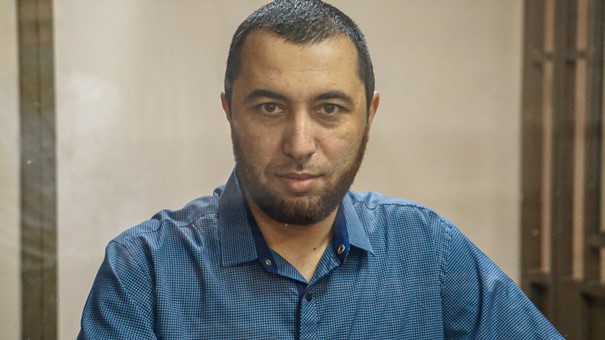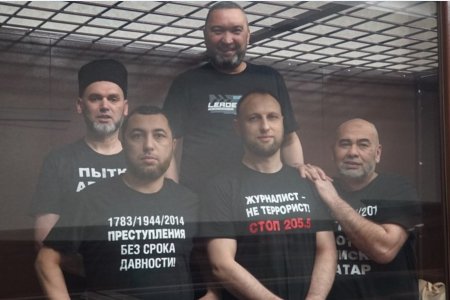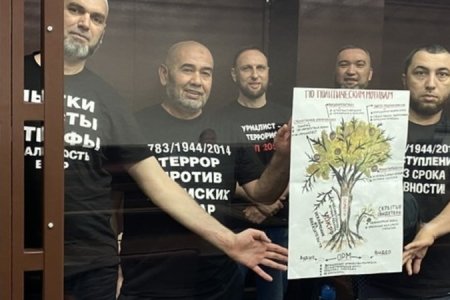
Osman Arifmemetov has lost 22 kilograms in Russian captivity, with the Crimean Tatar civic journalist and recognized political prisoner imprisoned in an appalling prison, over five thousand kilometres from his family and home in Crimea.
Arifmemetov is one of 25 Crimean Tatar civic journalists and activists arrested in Russia’s worst attack to date on the Crimean Tatar human rights movement in occupied Crimea. His internationally condemned 14-year sentence was upheld by a Russian ‘court’ in February 2024, with Osman sent to serve the first four years of that sentence in a Krasnoyarsk region prison, the harshest of Russia’s penal institutions. He arrived at this prison in April 2024, and his mother has now told the Crimean Solidarity human rights initiative that he has been placed in particularly harsh conditions [‘SUS’]. She does not know why, however, judging by the fact that other political prisoners have also faced this, it is probably a standard part of the brutal treatment meted out in these institutions. The SUS regime, however, means that any telephone calls are prohibited, with the only possibility for contact being via letters. In his letters, Osman clearly tries not to say too much about the harsh conditions, and his mother does not know why he has lost so much weight. It is clear, however, from the few details he does give that he may have problems with his kidneys, and evidently needs a proper medical investigation and treatment. The international NGO Reporters without Borders has added their voice to concern about Osman’s state of health. They “condemn the conditions of his detention and call for medical follow-up and his release.”
Russia has already tortured one of the 25 political prisoners, Dzhemil Gafarov, to death and the state of health of all of the others after over five years in Russian captivity has been seriously compromised. The men are all practising Muslims which the Russian penal service constantly, perhaps deliberately, ignores, serving pork, which the men cannot eat. Even without this problem, however, the food and conditions in general are appalling, with healthcare facilities gravely inadequate. In Arifmemetov’s case, the head of the medical unit has only allowed him to receive two medicines – Voltaren for back pain and a prescription drug for a urinary infection. Needed medication is not provided by the penal service, with such ‘permission’ merely meaning that his family are allowed to send him the medication. Other medication, which he may well need, will simply not be accepted.
By profession, Osman Arifmemetov (b. 28.08.1985) is a maths and information science teacher and programmer. He and his wife have a daughter, Fatima, b. 2015 and son, Mustafa, b. 2017. Although it had been clear since 2017 (at the latest) that Russian FSB revenge against those who reported Russia’s rights violations would be ferocious, Arifmemetov refused to be cowered into silence. He became a freelance journalist for Crimean Solidarity, providing coverage of armed searches; arrests and political ‘trials’. Like most other Crimean Solidarity civic journalists and activists, he faced various forms of administrative prosecution for his human rights work, including a brief term of administrative arrest in February 2017 for streaming information about the latest politically motivated ‘operation’ against a Crimean Tatar civic activist.
Arrests as attack on the Crimean Tatar human rights movement
23 Crimean Tatar journalists and activists were arrested on 27 March 2019, as well as two other activists Rayim Aivazov and Eskender Suleimanov, the brother of one of the civic journalists Ruslan Suleimanov, seized a little later.
Both the US State Department and the EU called the move illegal and demanded the men’s release. Human Rights Watch called the arrest “an unprecedented move to intensify pressure on a group largely critical of Russia’s occupation of the Crimean Peninsula” and stated unequivocally that attempts “to portray politically active Crimean Tatars as terrorists” is aimed at silencing them. Freedom House and Civil Rights Defenders called the arrests “yet another serious abuse of power by the de facto authorities, transparently aimed at striking fear into a community that has suffered severely during Russia’s occupation of Crimea”. The Memorial Human Rights Centre was swift to declare all the men political prisoners and denounce the attempt “to crush the Crimean Tatar human rights movement”.
Arifmemetov himself received a letter from prominent US political philosopher Francis Fukuyama in which the latter thanked him for his courageous work in telling the world what was happening under Russian occupation.
Horrific sentences without a crime or evidence
Although Russia invariably uses charges of ‘terrorism’ (Article 205.5) and of ‘plans to violently overthrow the state’ (Article 278), all 25 Crimean Tatars were accused solely of unproven ‘involvement’ in the Hizb ut-Tahrir movement, a peaceful transnational Muslim party which is legal in Ukraine and which is not known to have carried out acts of terrorism anywhere in the world. In occupied Crimea, such prosecutions and sentences are very clearly used as a weapon against Crimean Tatar civic journalists and activists.
All of the men were immediately placed in detention, although Dzhemil Gafarov had medical conditions that, even by Russian standards, should have precluded any imprisonment. Five men, including prominent journalist Remzi Bekirov, were charged with the more serious ‘organizing’ of a Hizb ut-Tahrir group (Article 205.5 § 1 of Russia’s criminal code). Arifmemetov was ‘tried’ together with fellow civic journalists Ruslan Suleimanov and Rustem Sheikhaliev, as well as civic activists Enver Ametov and Yawar Muyedinov
The charges were based on a conversation about religion, politics, courage, which the FSB had illicitly taped three years prior to the men’s arrests. There were glaring discrepancies between the actual tape and the purported transcript of what is said, with some too critical to believe them accidental. The FSB sends such ‘transcripts’ to its own ‘experts’, who lack any competence to provide the demanded assessments, but can be relied upon to claim ‘proof’ to back the charges.
The main part of the ‘evidence’ came from entirely anonymous ‘witnesses’ who may not even know the men. In one case, such an alleged witness, was demonstrated in court to have changed his supposed ‘testimony’ to fit changes in the prosecutor’s charges.
Sentences
Despite the evident lack of a crime or proof even of involvement in Hizb ut-Tahrir, yet prosecutor Yevgeny Kolpikov demanded sentences of 15-17 years, with 5 years in a prison. On 24 November 2022, ‘judges’ Viacheslav Korsakov (presiding) Denis Galkin and Igor Shendrikov from the notorious Southern District Military Court in Rostov sentenced the three Crimean Solidarity civic journalists Osman Arifmemetov; Rustem Sheikhaliev and Ruslan Suleimanov to 14 years, and civic activists Enver Ametov and Yashar Muyedinov to 13 years. In all cases, the first four years were to be in a prison.
On 1 February 2024, presiding judge Sergei Aleksandrovich Butusov, together with Maxim Aleksandrovich Panin and Oleg Aleksandrovich Yegorov from the Military court of appeal in Vlasikha upheld the sentences.
Russia is imprisoning Osman Arifmemetov and the other journalists and activists thousands of kilometres from their families, with visits, even when these are allowed, gruelling difficult and prohibitively expensive. Please help ensure that they are not forgotten, and that pressure is put on Russia to release them!
If you can, please write to Osman! The letters need to be handwritten in Russian, and on ‘safe’ subjects.
Address:
Россия 662606, Красноярский край, г. Минусинск, ул. Горького, 114, ФКУ Т ГУФСИН России по Красноярскому краю,
Арифмеметову, Осману Фератовичу, г.р. 1985
The address can be in English
Russia 662606, Krasnoyarsk kraj, Minusinsk, Gorky St., 114, Prison No. 7
Arifmemetov, Osman Feratovych, b. 1985



